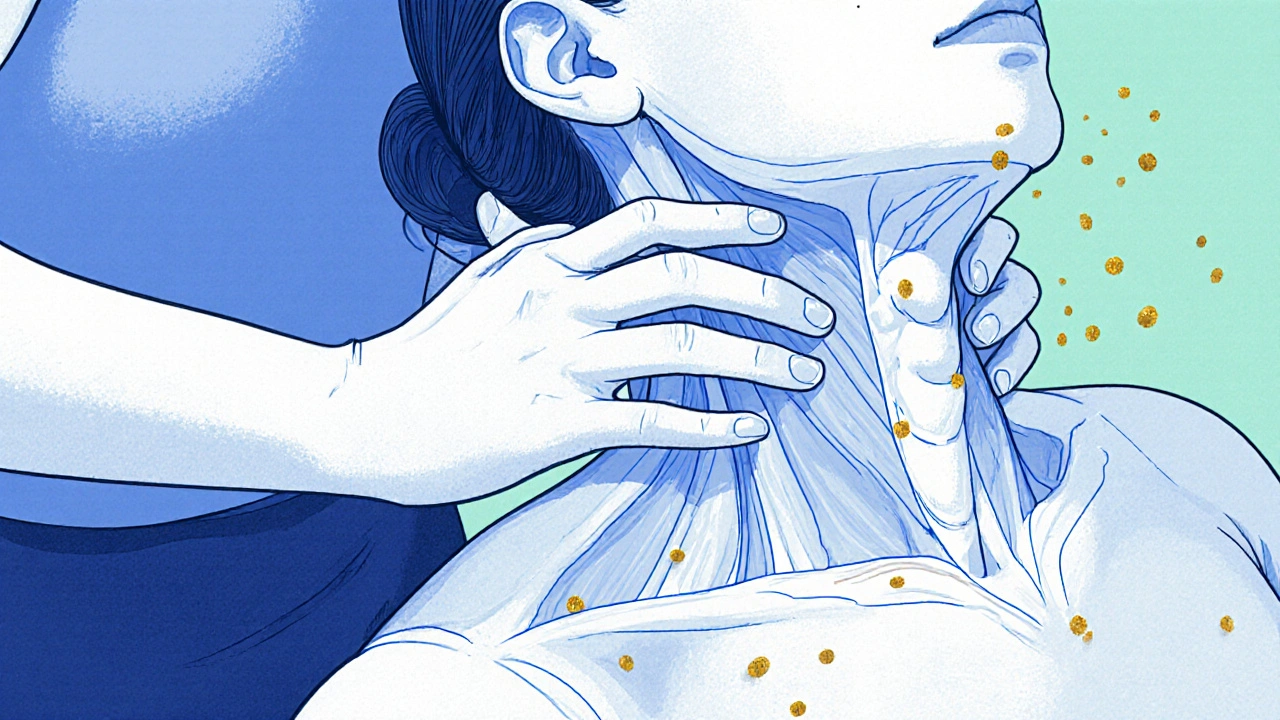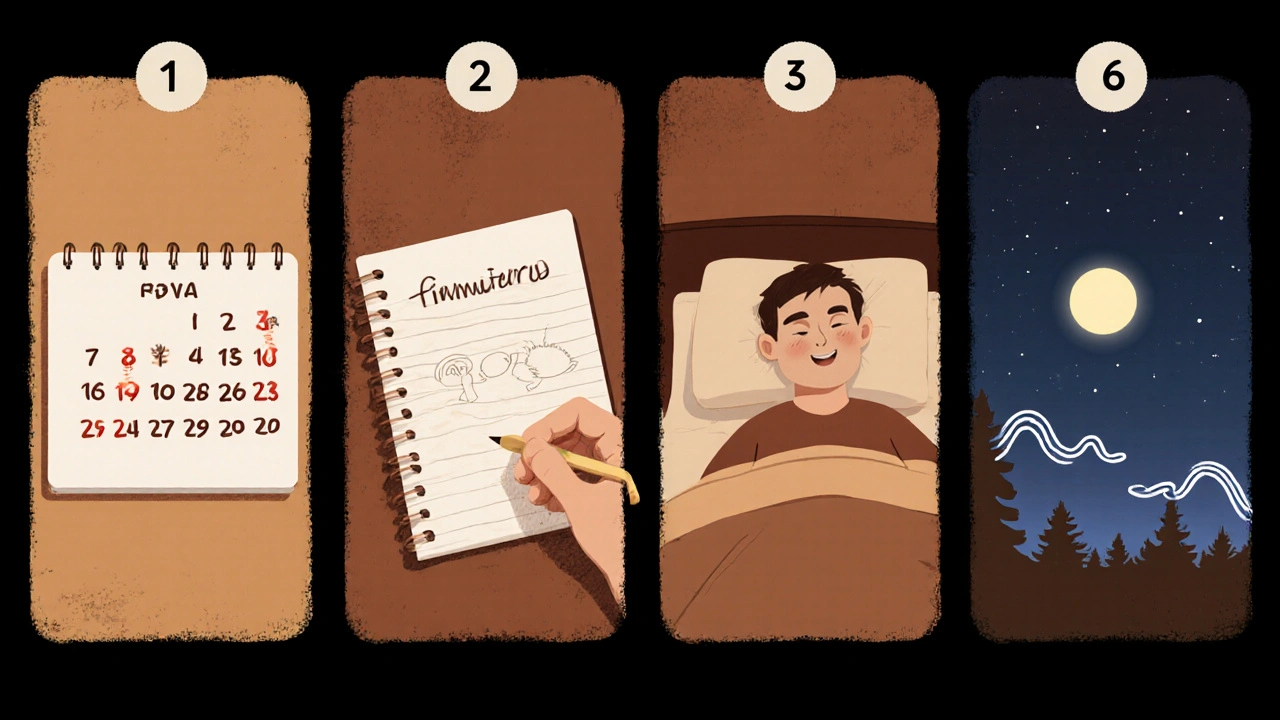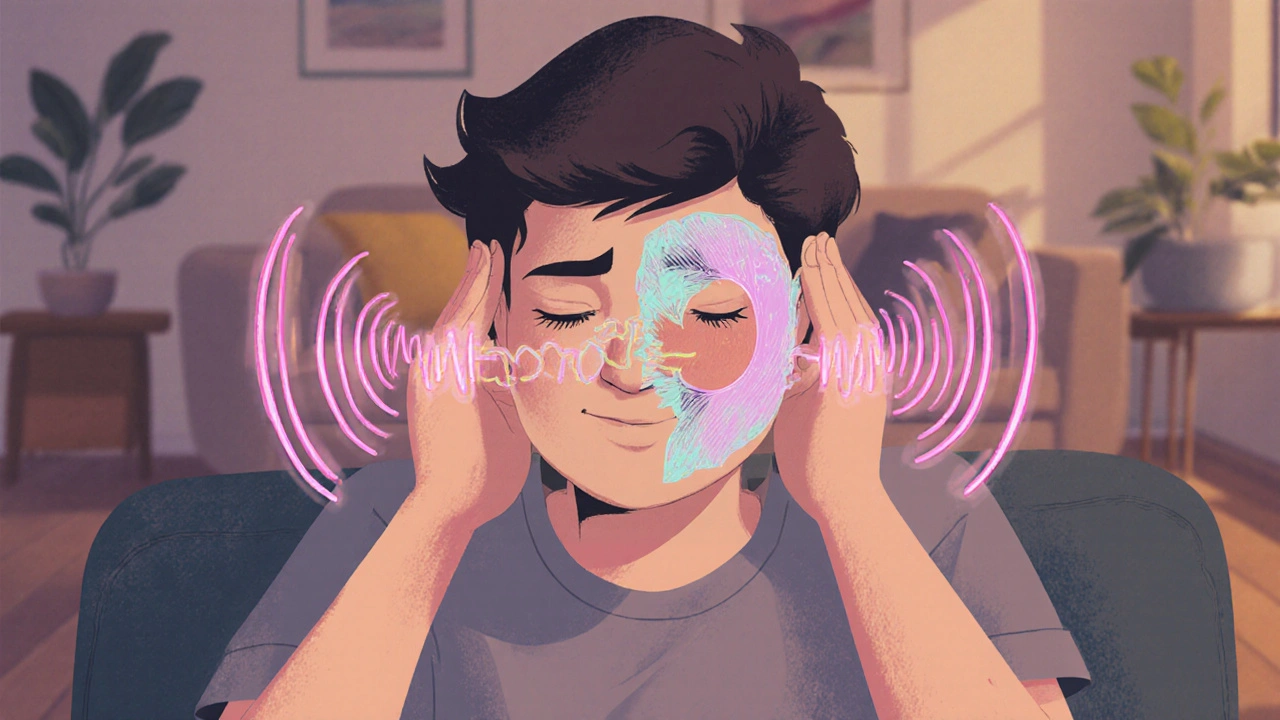When you hear a constant Tinnitus is the perception of sound-often a ringing, buzzing, or hissing-without an external source, you might wonder about non‑drug options. One question that pops up a lot is whether tinnitus massage therapy can actually calm that unwanted noise. Below you’ll find a straight‑forward look at the science, the techniques that show promise, and the practical steps you can take right now.
What Is Tinnitus and Why Does It Happen?
Tinnitus isn’t a disease; it’s a symptom. It can stem from anything that disrupts the delicate signaling chain between the inner ear and the brain. Common culprits include prolonged exposure to loud music, ear infections, high blood pressure, and even stress. When the Cochlea-the spiral organ inside the inner ear-gets damaged, the hair cells send erratic signals through the Auditory nerve. The brain tries to make sense of the noise, often amplifying it into the ringing you hear.
Because the brain’s auditory pathways are linked to other neural networks, factors like Stress and poor Blood circulation can worsen the perception. That overlap is where massage therapy steps in-by targeting muscles, fascia, and circulation, it may indirectly calm the auditory system.
How Massage Therapy Works: The Basics
Massage therapy is the manipulation of soft tissue to improve circulation, reduce tension, and promote relaxation. While it’s best known for easing sore backs, certain techniques also address the neck, jaw, and shoulders-areas that house key nerves linked to ear health.
Two concepts are crucial:
- Trigger points: Tiny knots in muscle fibers that can refer pain to distant locations, including the ear.
- Myofascial release: Gentle sustained pressure that loosens the fascia (the connective tissue that surrounds muscles) and improves blood flow.
When you release a trigger point in the sternocleidomastoid or the upper trapezius, you may also ease pressure on the Auditory nerve as it travels near the jaw. That can translate into a quieter perception of tinnitus.
What the Research Says
Scientific data on massage for tinnitus is still emerging, but a handful of small studies give us clues.
- A 2022 pilot trial in Japan enrolled 30 participants with chronic tinnitus. They received weekly myofascial release focused on the neck and shoulder. After eight weeks, 60 % reported a noticeable drop in loudness, measured on a visual analog scale.
- A 2021 systematic review of complementary therapies highlighted massage as one of the “potentially beneficial” options, noting that the mechanism likely involves stress reduction and improved micro‑circulation.
- Neuroimaging studies show that deep‑tissue massage can modulate activity in the auditory cortex, hinting at a direct brain‑level effect.
While none of these studies are large enough to declare massage a cure, the consistency of modest improvements suggests it’s worth trying-especially if you’re already exploring other non‑pharmaceutical routes like White noise therapy or Acupressure.

Massage Techniques That May Help
Not every massage will touch the right spots. Below is a quick comparison of three approaches that have shown promise for tinnitus relief.
| Technique | Key Target Areas | Typical Session Length | Evidence Strength |
|---|---|---|---|
| Swedish Massage | Neck, shoulders, upper back | 45‑60 min | Low - general relaxation benefits |
| Myofascial Release | Sternocleidomastoid, trapezius, temporomandibular fascia | 30‑45 min | Medium - small trials show symptom reduction |
| Trigger‑Point Therapy | Specific knots in neck and jaw muscles | 15‑30 min per area | Medium - anecdotal reports and pilot data |
If you’re new to massage, start with a gentle Swedish session to gauge your body’s response. Then, if you feel comfortable, ask the therapist to focus on myofascial release or trigger points in the neck and jaw.
When to Try Massage and What to Expect
- Eligibility: Most adults with chronic or intermittent tinnitus can try massage, provided they don’t have open wounds, severe skin infections, or recent neck surgery.
- Frequency: Two to three sessions per week for the first month, then taper to once‑a‑week as you notice improvement.
- What you’ll feel: Light to moderate pressure, occasional stretching of neck muscles, and a warm, relaxed sensation. Some people notice an immediate drop in ringing; others feel a gradual change over weeks.
- Measuring progress: Keep a simple log. Rate your tinnitus loudness on a 0‑10 scale before each session and note any changes in sleep, concentration, or mood.

Potential Risks and Contraindications
Massage is low‑risk, but it isn’t free of warnings.
- People with Hypertension should avoid overly vigorous techniques that could spike blood pressure.
- If you have a history of vertigo, certain neck manipulations might trigger dizziness-choose a therapist skilled in vestibular safety.
- Those on blood thinners need to be cautious about deep tissue work that could cause bruising.
Always inform your therapist about any medical conditions, medications, or recent surgeries before the first session.
Putting It All Together: A Practical Guide
Here’s a step‑by‑step plan you can follow this week.
- Find a licensed massage therapist who lists myofascial release or trigger‑point therapy among their services.
- Schedule a 45‑minute session. Mention you’re dealing with tinnitus and would like focus on neck, jaw, and shoulder areas.
- During the session, ask the therapist to locate any tender knots in the sternocleidomastoid, upper trapezius, and temporomandibular fascia.
- After each session, record your tinnitus loudness rating, sleep quality, and mood for the next 24 hours.
- Repeat 2‑3 times per week for four weeks, then reassess. If you notice a drop of 2 points or more on the 0‑10 scale, keep the routine; if not, consider adding complementary methods like Acupressure or cognitive‑behavioral therapy.
Most people find the biggest gains come from the combination of reduced muscle tension and lower stress hormones, both of which are known to amplify tinnitus.
Frequently Asked Questions
Can massage cure tinnitus?
No, massage isn’t a cure, but it can lessen the perceived loudness for many people, especially when stress and muscle tension are major contributors.
How long does it take to see results?
Some report immediate relief, but most studies show noticeable improvement after 4‑8 weeks of consistent sessions.
Do I need a specialist therapist?
A therapist trained in myofascial release or trigger‑point therapy is ideal. General Swedish massage can help too, but ask for focus on neck and jaw areas.
Is massage safe if I have high blood pressure?
Gentle techniques are usually safe, but avoid deep pressure that spikes heart rate. Talk to your doctor and therapist beforehand.
Can I combine massage with other tinnitus treatments?
Absolutely. Many patients pair massage with sound therapy, mindfulness, or dietary changes for a more holistic approach.
In short, if you’re fed up with that endless ring, give massage a shot. It’s low‑cost, low‑risk, and might just give your ears the quiet break they’ve been begging for.




Mahesh Upadhyay, October 20, 2025
Honestly, the idea that a simple rub‑down can silence a persistent buzz sounds like a marketing gimmick. The article glosses over the fact that tinnitus often stems from neurological damage that massage can’t fix. Sure, reducing neck tension might ease some stress‑related flare‑ups, but it’s not a universal remedy. Don’t expect a miracle; treat it as a complementary tool, not a cure.
Rajesh Myadam, October 26, 2025
I get why you’d feel skeptical – chronic ringing can be exhausting. At the same time, many patients report that loosening tight shoulder and jaw muscles gives them a noticeable relief in the volume of the noise. It’s worth a trial, especially if you pair it with sound therapy and stress‑management techniques. Even a modest drop in perceived loudness can improve sleep and concentration.
barnabas jacob, November 1, 2025
From a biopsychosocial perspective, the mechanistic pathway linking myofascial release to auditory cortical modulation remains under‑investigated. The current literature suffers from a paucity of randomized controlled trials (RCTs), leading to a de facto reliance on anecdotal evidence hierarchys. Moreover, the neurovascular coupling hypothesis posits that enhanced micro‑circulation may attenuate ectopic neuronal firing, yet causality is not definitively established. Thus, while the approach is not outright harmful, its efficacy is, at best, supported by low‑level evidence.
jessie cole, November 7, 2025
Indeed, the scientific community has yet to reach a consensus, but the potential benefits should not be dismissed outright. As your coach, I encourage you to adopt a balanced regimen: incorporate qualified myofascial therapy alongside proven auditory rehabilitation methods. Even a modest improvement can dramatically enhance quality of life, especially when stress reduction is factored in. Let us proceed with cautious optimism, guided by both evidence and patient experience.
Kirsten Youtsey, November 12, 2025
Let us be frank: this article reads like a repackaged wellness brochure cooked up by the same corporate interests that sell overpriced supplements and boutique clinics. The so‑called “pilot trial” in Japan is likely funded by a network of alternative‑medicine promoters who thrive on the fear of “untreated tinnitus.” While the author sprinkles a few study references, the underlying narrative pushes a hidden agenda: to commercialize every minor health nuisance under the guise of “holistic care.”
Matthew Hall, November 18, 2025
Wow, that’s a bold claim, but honestly, the “hidden agenda” you mention sounds like every fringe theory out there. I think the real issue is that people are desperate for any relief, and they’ll grab whatever sounds plausible, even if it’s just a few minutes of neck rub. Still, I’d rather try a massage than sit in endless conspiracy forums. At the end of the day, it’s about what actually eases the ringing, not who’s selling it.
Vijaypal Yadav, November 24, 2025
Tinnitus is a heterogeneous condition that can arise from damage to the cochlear hair cells, neurovascular deficits, or central auditory processing disorders. The acoustic trauma hypothesis accounts for a significant proportion of cases, especially in individuals with occupational exposure to high decibel levels. Vascular insufficiency, particularly in the vertebral-basilar circulation, can exacerbate the perception of phantom sounds due to reduced oxygenation of the auditory nuclei. Stress‑induced dysregulation of the hypothalamic‑pituitary‑adrenal axis has been shown to modulate the auditory cortex excitability, thereby amplifying tinnitus intensity. Myofascial trigger points in the sternocleidomastoid and upper trapezius may refer pain to the ear via the accessory and vagus nerves, creating a somatosensory‑auditory interaction. While massage therapy can improve local blood flow, the magnitude of micro‑circulatory enhancement is limited by baseline endothelial function. A systematic review of nine small‑scale studies reported an average reduction of 1.2 points on a 10‑point visual analog scale, which is statistically modest. The placebo effect, particularly in interventions that involve physical touch, can contribute significantly to subjective improvement. Moreover, heterogeneity in study designs-varying session frequencies, therapist expertise, and outcome measures-makes meta‑analysis challenging. Clinicians should therefore consider massage as an adjunct rather than a primary treatment modality. Concurrent use of evidence‑based tinnitus retraining therapy, cognitive‑behavioral approaches, and sound enrichment yields more robust and durable outcomes. Patient selection is critical; individuals with predominantly somatic tinnitus may respond better to myofascial interventions. Conversely, those with neurogenic tinnitus stemming from cochlear degeneration are less likely to benefit from peripheral muscle manipulation. In practice, a personalized protocol that incorporates targeted myofascial release, stress management, and auditory rehabilitation offers the most comprehensive strategy. Ultimately, massage can be a valuable component of a multimodal regimen, provided expectations are calibrated to realistic, modest gains.
Ron Lanham, November 30, 2025
While your thorough breakdown of the pathophysiology is commendable, it is imperative to recognize that reducing complex neuroauditory phenomena to a simple “adjunct” diminishes the gravity of patient suffering. The moral responsibility of clinicians extends beyond offering meager comfort; they must advocate for treatments grounded in robust evidence, not fleeting trends that capitalize on desperation. It is ethically indefensible to present massage as a panacea when the data, as you aptly noted, reveal only modest benefit at best. Moreover, the reliance on placebo effects raises serious concerns about informed consent, as patients may be misled about the true efficacy of the intervention. In a healthcare landscape increasingly dominated by profit motives, we must demand transparency and prioritize interventions with demonstrable, clinically significant outcomes. The notion that “modest gains” are sufficient overlooks the cumulative burden of chronic tinnitus on mental health, sleep, and overall quality of life. Therefore, I assert that any recommendation of massage therapy must be accompanied by a clear disclaimer outlining its limited impact and the necessity of combining it with proven modalities. Neglecting this duty betrays the trust placed in us by individuals seeking genuine relief. Let us uphold the highest standards of patient care by emphasizing evidence‑based practices while still acknowledging the occasional role of complementary therapies when appropriately framed. In sum, we owe our patients honesty, rigor, and unwavering commitment to therapeutic efficacy.
Deja Scott, December 6, 2025
These insights highlight the importance of cultural sensitivity when recommending therapies.